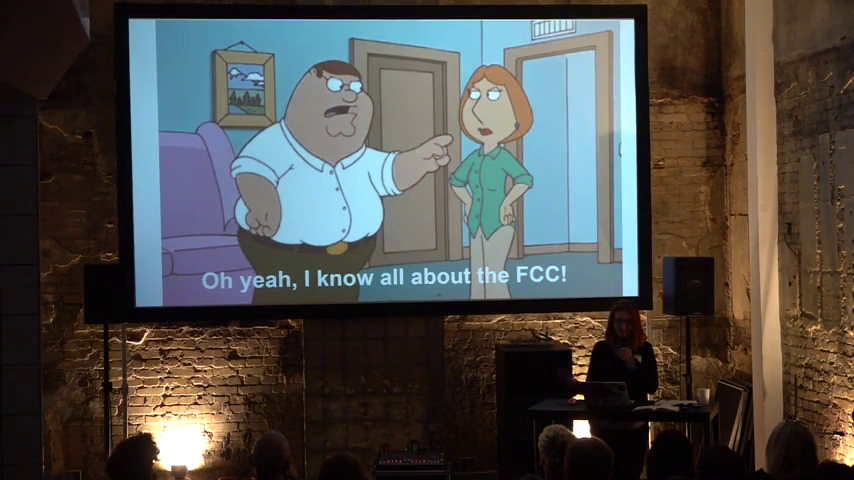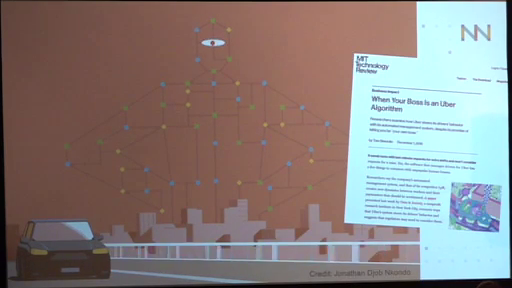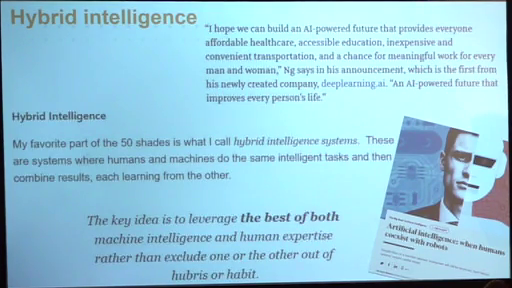Elma Avdic: Thank you. So my name’s Elma. And I work in the CONNECT Research Centre for Future Networks and Communications based in Trinity College Dublin. What I want to talk to you about is this idea of machines governing things. And one particular thing that I see governed by the machines is the radio spectrum. That’s an example where I see this kind of regulation can work, and I guess the most radical thing about it is that I think a robotic regulator can actually bring more human values to its regulation. So hopefully I will show you why I think that and how that can happen.
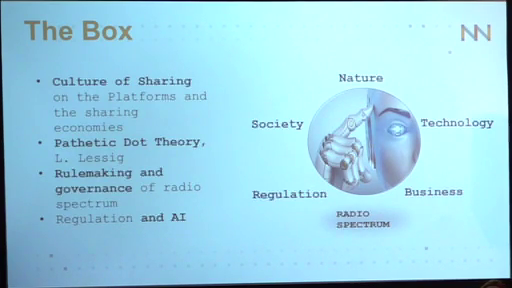
So, I have so many things to tell you with little time, and I just kind of want to open this box and you take from it what touches you and unpack it further. I did a PhD thesis on the culture of spectrum sharing, “Emancipation of the Hertz,” that was the title. It was a multi-domain analysis of spectrum sharing, starting from nature, the domain of nature where we find the resource; through the domain of technology, which puts the resource to use and in the case of spectrum it makes it exist; through the domain of business, where radio spectrum is used by a service provider to produce capacity and sell it out to the customers, to the end users—to us. That all happens under the domain of regulation under some rules. And up to the domain of society as spectrum is used so much in everyday communication. And I see spectrum as a social issue per se.
So I feel that the right way of thinking about how to implement this AI regulator, the machine-enabled regulation of spectrum sharing is to input the principles into the machine, because the machine has to learn from something, right? So I think it’s about the principles, not rigid if-then-else rules, because they don’t really give space to the machine to be really intelligent and get out of the rules. So, I will talk from where we can extract these principles, how that relates to radio spectrum, what kind of governance and structures are behind the radio spectrum, where is the problem with that, and what is this legacy that you’re supposed to go with into the connected future. And finally, how can we make AI-enabled regulation for spectrum sharing.
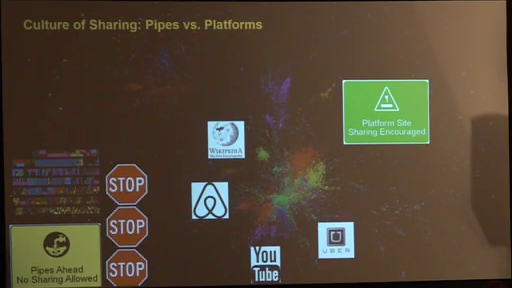
We made a myth out of sharing. The non-sharing structures governing the underlying pipes of the digital world want us to think that we’re already sharing enough by sharing bikes and pets. And that’s a populist discourse made to hide their hegemony and protect it from reformation. So in this map of the Internet, the bright colors where sort of the fireworks are, it’s the place of platforms where we do share. And it sort of shows how we celebrate and take pride in the way we share on platforms. But we just sit silently in the dark when it comes to the pipes, and that’s where the radio spectrum and the infrastructure are.
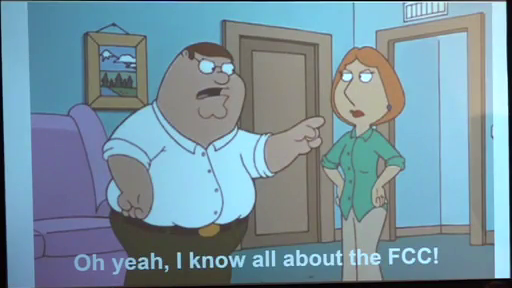
So, there is a lot at stake when it comes to radio spectrum, so let’s start meeting the stakeholders and let’s start from the head. The FCC is the regulator, the policymaker, and policy enforcer. So be like Peter from Family Guy, know everything about the FCC. In particular we need to learn about the FCC history and its unfair race with technology. Unfair because technology’s flying, and the FCC is doing a crab dance.
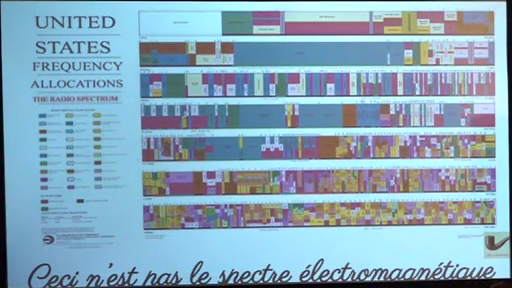
As much as the Big Spectra wants us to believe it, the balkanized, entrenched, guarded allocation chart is not the electromagnetic spectrum. Placing ownership and protection in the very definition of their working definition of electromagnetic spectrum, they made it a piece of invisible land in the sky. But it’s not. It’s a special resource, usable in brilliant ways simultaneously, instantly renewable and magically exploitable by the ever-progressing technology. And yet, they keep it bound in a chart. So spectrum is not the problem, nor is the technology. It’s the humans, the creatures of regulatory habit.
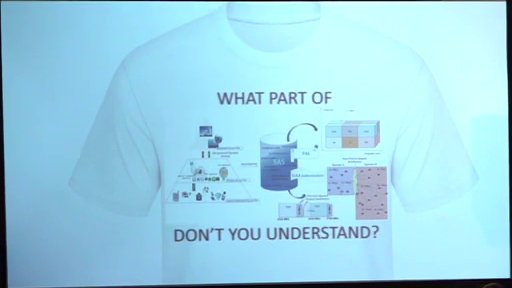
In an effort to please everyone with financial power and not to leave the comfort zone much, the regulator comes up with these complex spectrum sharing systems. It is commendable that they finally recognize the potential of unused spectrum. And in the case of the depicted CBRS spectrum sharing model, it is the rarely-unused military spectrum in the 3.5 gigahertz band. But, as we speak the FCC is preparing to announce in a few days that this new space is going to be turned into yet another parking lot for the big carriers. So, what are the alternatives to that? Making it a national park? Sort of a nod to commons. Or a third way?
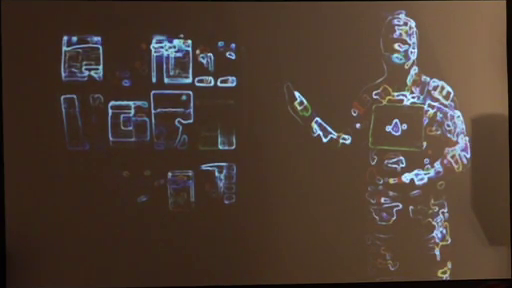
It’s clear that we cannot go on anymore with the same old same old. A sustainable future asks for new more sustainable business models. And the resources have started shapeshifting. Rigid, non-shapeshifting businesses won’t be able to process the fluid resources of the future. In wireless communications, they can not still be just phone companies, and not every player has to be a big one anymore. Everyone can do a small part and make their money in the market with what they have. This democratization of the market seems also natural and totally in the spirit of net neutrality and other movements that are protecting small businesses by using the benefits of the World Wide Web. And yet we don’t talk about it. So is it too distant, too abstract? It shouldn’t be. So you might want a piece of this spectrum pie in the sky. And you want to become a provider. So by the benefit of sharing, you won’t be facing this dilemma of having your piece or eating it.
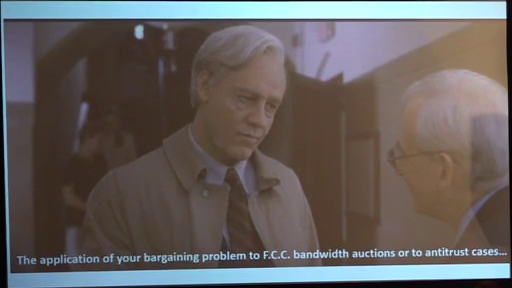
So the current market is defined by big companies bidding for chunks of spectrum for their exclusive use under the FCC’s terms. It is ensured that these chunks are far apart, because the bidders are afraid of the other users disrupting their service. And they, as well as the regular rules, imagine these others have Fred Flintsone-like equipment, leaky and loud. And…they don’t. So based on that, they devised these bulky defense mechanisms at the expense of spectrum.
And as in that famous selective attention video, while you keep an eye on the ball you miss the gorilla in the basketball court. So here the guerrilla is the spectrum scarcity. Everyone is complaining there’s not enough spectrum. But they never join their forces to fight this lack together and make a proper utilization of spectrum a common priority. So no, they hoard unused spectrum and then point fingers to the others doing the same. It’s their business model. So Professor Nash has every right to be disappointed in this scene. The market is playing the wrong game, against the wrong opponent.
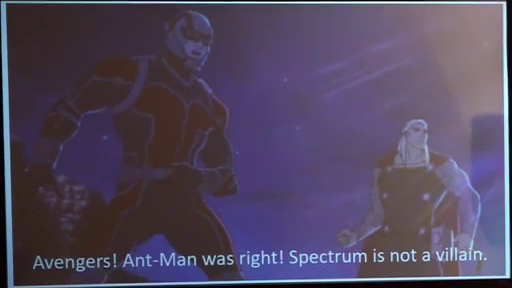
Spectrum is an amazing natural resource with many beautiful features, and yet it is posed as a hostile territory that needs to be colonized and tamed. That’s wrong. We should team up with the spectrum and its superpowers.
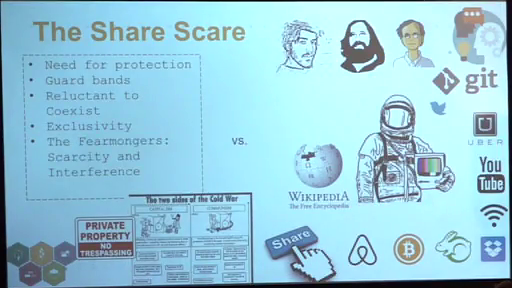
Okay, so step into the big carriers’ shoes for a second. It’s hard to blame them. They are doing what everyone else is doing, fighting for profit in the only battlefield they know. And the world would collapse without them; they’re too big to fail. So democratize the market already. If you’re too big to fail perhaps you’re too big to exist.
And so they repeat their arguments, like the list in the slide. And because it’s the dogma which protects their assets. And yet humans, in their own shoes, they see a different picture. People see how things can work on human principles. How sharing functions in the creative digital world. So, they speak against big company proprietary narratives. So people like Richard Stallman, Aaron Swartz, Lawrence Lessig. Lessig spoke about spectrum as well and recognized the role of the commons and prophesied the success of WiFi. So we need more Lessigs in spectrum, we need the enthusiasm of Richard Stallman and Aaron Swartz, to take spectrum from bottom-up.
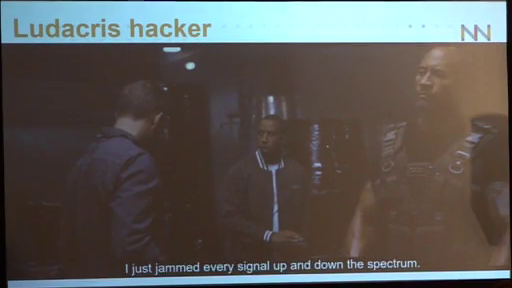
Because the mainstream doesn’t get spectrum. It’s mumbo jumbo for them so, Ludacris can say something this ludicrous.
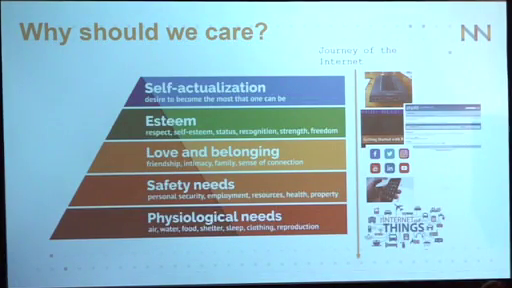
And yet, spectrum is enabling each and every rung of our needs hierarchy today. The early Internet started from the top of the pyramid. The revolution that wireless access brought stormed it all the way to the foundation.
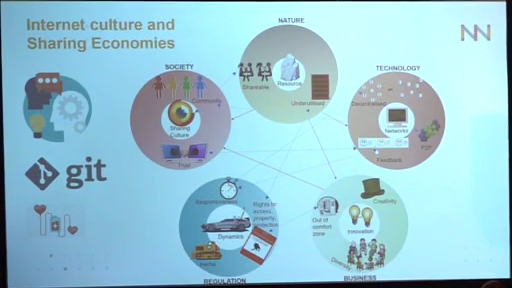
So you see me getting all personal here already. I studied spectrum in the perspective of sharing economies, detecting these five domains where enablers for proper sharing can grow. So these domains are nature, where the resource is; technology, were the networks are; business, where the innovation is the enabler; regulation, where the neighbor for sharing is dynamics and responsiveness; and society, where the culture of sharing is the enabler.
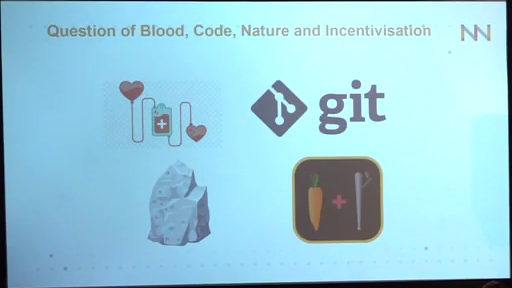
So I looked at the wax and wane of sharing, from blood to code. So why do we commit more to Git repositories than to blood banks? The logic behind a successful sharing model needs to rely on two factors. That is proper utilization of the nature of the resource, and the second one is sensible, meaningful incentivization. Both of these mechanisms mobilize the five domains, and they cannot work without balance in them.
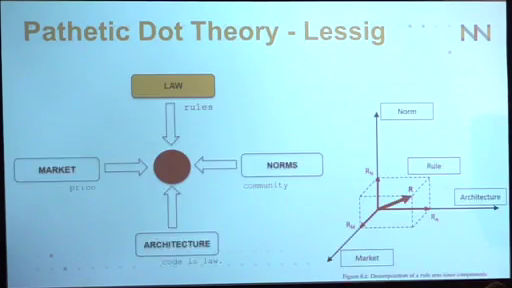
So balance. That’s what Lessig also said when he devised his own regulation theory, the one of the pathetic dot. So the dot is the behavior we want to regulate. The forces that the act on it are law, markets, norms, and architecture. Kind of sounds like what I just mentioned but there were five domains there and here are four forces, but we’ll get to that.
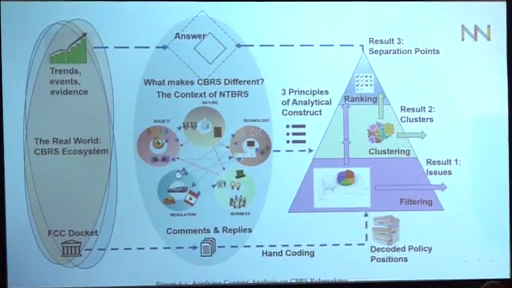
That CBRS model that you saw on the t‑shirt earlier. That’s the best we’ve got, and that says a lot about just how spectrum sharing is not working. So I did a comprehensive, rigorous content analysis of it’s rulemaking proceeding, which is publicly available on the FCC web. The coded language companies use to talk to the regulator in order to push their agenda into the rulemaking, I tabulated their opinions issue raised. That helped cluster them and establish the clear teams in the game, as well as to see the most important issues that were supposed to make the CBRS sharing model different from anything we have seen so far. AI helped with this. So we had a hybrid partnership where I was the context master and the AI was the content master.
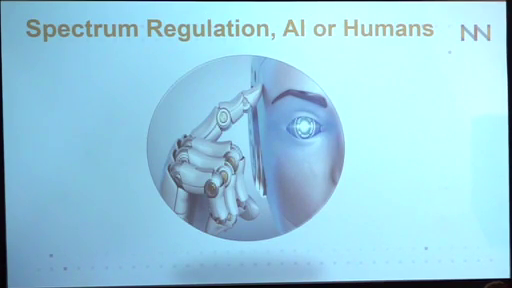
So reading thousands of FCC MultiLog pages told me everything I needed to know about the problems of human regulation of spectrum. So, why don’t we let AI take care of it? Or should we do it in tandem, the way I did the content analysis?
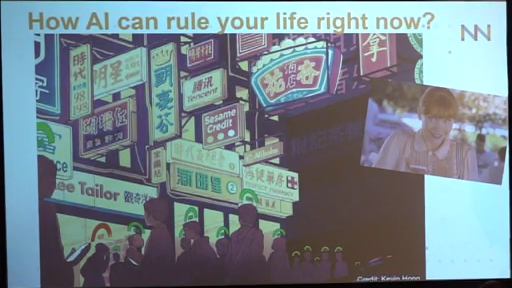
We are terrified with the machines putting numbers on us based on some nontransparent algorithms, because who knows what’s in there? We are also terrified by the machines putting numbers on us based on a transparent algorithm, because adversarial engineering will find a way to game the system and harm us, the fair players. Even when humans try to metricize us, we often say, “Hey, you don’t know the context. You don’t know the whole story. So keep your context non-aware machines from us.”
So escape one boss and you end up being bossed by an algorithm. Is that the future of the sharing economy revolution? That’s dystopia coated with sharing. Can we do better? And why am I not talking about spectrum yet?
Data is not going away. Nor are computers—much less mathematics. Predictive models are, increasingly, the tools we will be relying on to run our institutions, deploy our resources, and manage our lives. But as I’ve tried to show throughout this book, these models are constructed not just from data but from the choices we make about which data to pay attention to—and which to leave out. Those choices are not just about logistics, profits, and efficiency. They are fundamentally moral.
Cathy O’Neil, Weapons of Math Destruction
So data is the new religion. Just put enough data in, and the result will come. Big data will solve everything. And while it may seem like I’m jumping on that bandwagon, let me tell you something. Data is not just data. It is a new dimension of spectrum. It’s not a description of spectrum, it is spectrum. It’s the total opposite of the allocation chart.
And I wouldn’t ask for machines if I didn’t need them. But look at them. All fair and nice if we train them well. And I promise I’ll be there or someone like me to be a part of this dynamic duo, because that is everything the current system is not. It is a static, single tone. Even though it’s made by humans, it lacks context. And the time needed to make a progressive change is measured in lifetimes.
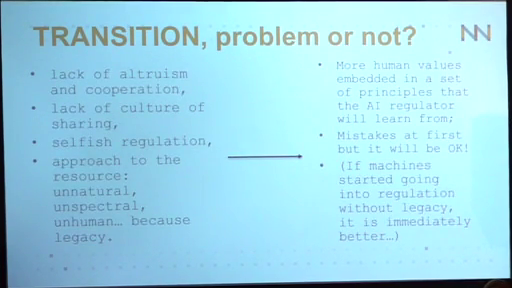
So how can we turn this dystopia to utopia? We don’t have to clone ourselves into digital versions. We don’t want a neural network emulating Herbert Hoover. Herbert Hoover is the embodiment of legacy in the FCC or a [?] decision tree. This is why the machines won’t be trained using rulemaking proceedings and FCC history. The burden of legacy is a curse we do not wish to pass on. In the spirit of everything the sharing economies taught me on my voyage toward successful spectrum sharing, I can tell you that it’s the basic principles the machines need. They can’t understand context? Well I can. But they can really adapt.
Fast and small changes of rules in different situations of the radio environment, it’s a dream come true for spectrum. The principle of maximizing spectrum utilization as the cradle leading a flexible ruleset which fits space-time-frequencies and data like a glove. Yes, please.
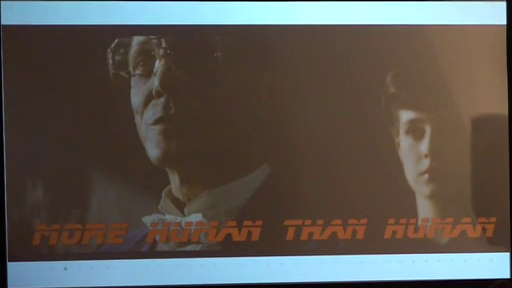
So the Tyrell Corporation was a spooky dystopian entity in Blade Runner. I mean how twisted do you have to be to promise building something more human than a human? I’m not promising that, I’m saying it’s already there. If we bundle the computer network to handle spectrum in Manhattan right now and replace the FCC, it would be more fair, more sustainable, more conscious, and more progressive than the humans of the FCC. And yet these traits are celebrated as human virtues. So I did this. I worked in Manhattan as a use case, and promised in the tease is that first we take Manhattan, so now let’s take Berlin.
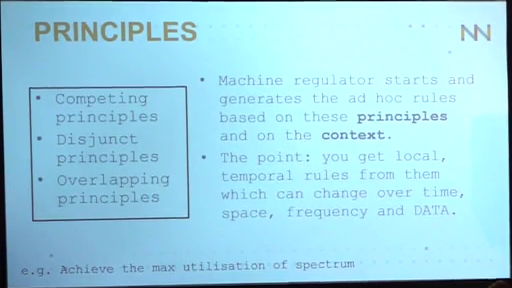
I fed a thousand pages of visionary takes on the future by revolutionaries into my computer and asked it to make me a slide. This was the result.
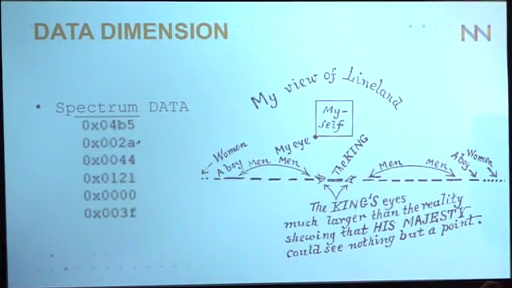
You know how I told you that data is a new dimension of spectrum? Well, people kept on adding dimensions to the definition of spectrum. First it was just frequencies. Then there was time. Then space. Then power. But data was slipping between our fingers because it was never that important. Why would you care about the real-time usage information from an adjacent user if they are far enough not to cause interruptions to your own use and the FCC’s keeping them at a convenient distance? But if the FCC lets the two of us be a bit closer and use the spectrum resource more efficiently, I will start looking at their data to dance with them. Use spectrum when they don’t, and they will reciprocate.
So, data is a dimension vital for sharing. A strong force that appears once spectrum users are close. So summon the data, then, and look out of your n‑dimensional space into n+1‑dimensional space.
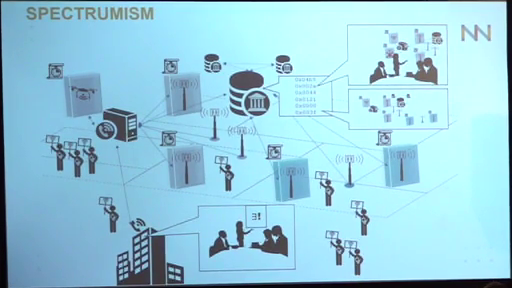
After I got all the results I wanted from the analysis, I had any image of a futuristic staring, where all enablers of sharing come together and make spectrum sharing the reality. So Lessig was right all along with the pathetic dot. It’s just that splitting the force of architecture into two, nature and technology, opened the door of perception for spectrum. It’s the nature of spectrum that has been missing from the regulatory equation all along. It kept us from building the culture of sharing because we didn’t understand it properly. Well that’s why I’m evangelizing it.
Spectrum is a unique resource. Get out in the streets and chant that, be aware of the ether in the bloodstream of the modern world, and the rigid control the state keeps over it. Only then will the boardrooms make a point about it and take new business models on board. They will build machines to talk to the regulatory machines. A new regulatory language, coded in a different manner will emerge. The data will plot history and the future of networks, and show where underutilization can be targeted. Licenses will be small in space-time-frequency, like renting bikes. No more fifteen-year licenses, take a fifteen-minute one. Be dynamic. Be like spectrum.
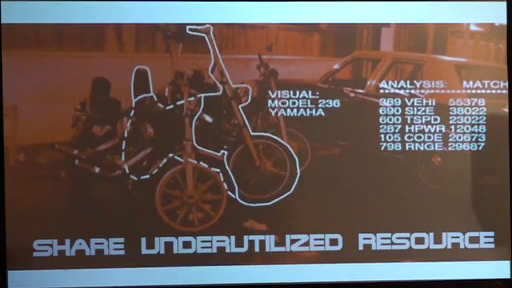
So speaking of renting and borrowing bikes, just like Arnie in The Terminator, the machines will put underutilized resources to use.
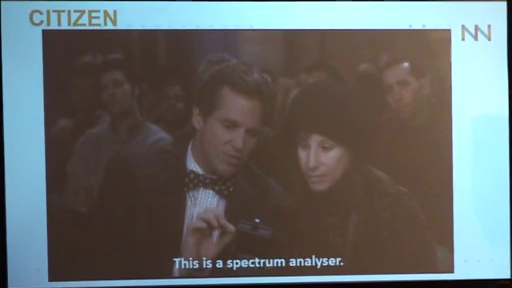
Citizens of [Telecosmos?], get your spectrum analyzer, start talking about spectrum; at least as much as you talk about Article 13 or net neutrality. So I just wanted to open this box and throw ideas out there, as I think we’re ready for a new society. And we need to start more actively challenging the legacy in rulemaking and governance. And we need systematic ways to fight them. Thank you.
Moderator: Thank you. So, questions. Yes. Well.
Audience 1: Well, I have tried to lobby for TV whitespace usage a little bit. I’m probably a terrible lobbyist myself. But I think it’s not all that shiny, like you say it. For example you talk about artificial intelligence like something that needs to be centrally localized somewhere. Which is the total fuck-up the FCC made with TV whitespace in the United States. Because that type of communication is relatively short-distance. So actually the devices in the field can actually detect when a channel is used, and then they can use it because it’s unused. And they have to be polite to each other.
So it’s not like you need a centralized entity that manages all those things, it’s the swarm intelligence that actually can build an effective artificial intelligence if you put in the right rules, rather than have it centralized somewhere. Or did I misunderstand your presentation?
Elma Avdic: So, I don’t know what you mean when you said you lobbied? for the whitespace. We can maybe talk about it afterwards. But this is not a centralized network. It’s a distributed regulator and distributed networks of operators. So it’s decentralized, what I had in mind.
Audience 1: I’m just a little confused because towards the end you said no more licenses for fifteen years, but the licenses granted for fifteen minutes. So there is an entity that grants the device, or the user or the business…whatever you named it when you’re talked about it, that licensed physically. Radio physics and radio devices are not that frequency-agile that they can operate in a totally different band, for example. Also, the band needs to fit the application that they’re built for.
Avdic: So, the licensees that I have here in the picture are granular and modular in space, time, and frequency. What I didn’t explain here, as I didn’t want to go into too many details—I didn’t see this as presenting results of my thesis but more like a talk. So, I have actually a machine replacement of a broker. A machine that is doing auctions— Not all auctions, like auctions on the spot, based on detecting the radio environment, calculating the— Because this data, which becomes really really important to users that are close in time, space, and frequency when it comes to spectrum sharing. So the machines are doing this real-time.
Audience 1: Well we should talk afterwards.
Avdic: Let’s talk, yeah.
Moderator: Further questions?
Audience 2: Hi. You talked a lot about the FCC. I was wondering if you could tell us who’s in charge of radio frequencies in Europe.
Avdic: So, regulation in Europe is a bit more complex than that. So there is Ofcom, which is the regulatory body in the UK. And it’s kind of a mini FCC system. It’s built like that; all the boards and offices. But the majority of the rest of Europe actually, everybody besides the UK…it’s an EU regulation, a set of countries; there is twenty-eight or twenty-nine set countries that are part of this. And each country has an NRA, that’s National Regulatory Authority. So basically each country has its own regulatory body, but they all submit to the European Commission laws of regulation.
Audience 3: Hello. I’m just trying to see if I understand your talk, right. So my understanding with like big companies, they pay loads of money for exclusive access for fifteen years or whatever. And what you’re suggesting is a bit more like…a bit how WiFi does channel-hopping. So lots of us might be able to share the same resources over kind of time slices instead. Where do you start with that? Because it sounds cool, but I don’t know how you go from here to there.
Avdic: So first there is a lot of work to be done. That’s where the magic happens. But your question about the licenses. So, I didn’t study sharing economies just like that. So what I learned is the importance of rights to access, and replacing the property rights which are currently the spectrum management model that these licenses are sold in auctions by—you know, it’s a property right, sort of. And what the users get in the license are two rights. One right is the right to be protected from interference—guaranteed protection and you know, quality of service. Guarantees and everything. And the other right is the right to exclude others from using their spectrum, even when they are not using it. So this is why it’s seen as a property.
So, what sharing economies are teaching us is that you don’t necessarily need to own a car anymore to get from Point A to Point B, so it’s about the rights to access and just reforming spectrum management models in this way. Because spectrum is a such a resource. It’s a fast-cleansing, recyclable resource. Instantly renewable. Perfectly renewable. So, I think that that can work.
Audience 4: In the diagram that you have on the screen right now, you made mention to the emergence of new business models? I was wondering if you had any speculations on what those might look like?
Avdic: I do, but I can’t tell you that. [laughs; audience laughter]
Audience 4: Fair enough.
Audience 5: In one slide, you put the sharing economy versus the legacy model. And there were two logos that I didn’t like; that was Uber and Airbnb. And I don’t recommend this practice, because according to Yochai Benkler (that is an important person that talks about the sharing economy) they call these kind of corporations “unicorns” because they cannot exist. They’re existing to destroy some legacy economies that are working, like hotel’s, hostel, or in the case of taxis, etc., no? So, these kind of people are probably putting in their presentations, “Oh, Wikipedia, Git, Linux…” and their company. And with this kind presentation I think it’s dangerous for us. Because then we are all with that kind of people.
Avdic: So um…I am not saying that sharing economies are great. I use them as an example as I was looking for just an example of successful sharing. So, what you just said about Uber and different kinds of platforms, these logos here are not here necessarily to reflect their ideology but just to show that sharing is happening. So there are different kinds of sharing. I’m not saying I agree with Uber—I don’t, of course, or these other types of sharing economies. But it’s here to show that a culture of sharing is developed on the platforms that are multidirectional business models. So they work like that. The user gets on the platform and creates content themselves, unlike the pipes which are unidirectional. So the spectrum management and distribution model is an example of a pipe model. So the regulator creates the supply of spectrum and pushes it out to the customers, who don’t necessarily have a say in the product; cannot change it or modified it. So yeah, I I take your comment on board. I won’t put this anymore here on a slide like this, because I I realize it may confuse people. But it’s not the ideology, it’s more of something that’s feasible right now. It’s the only sharing that works.
Moderator: Okay, one more question.
Audience 6: So maybe this is what the AI that you created does, but when I think of machine to machine I think of them having self-sovereignty, like the machine acts on its own. So in your case the spectrum would be able to sell itself to a corporation, where as it sounds like it’s still more of an asset in your model where someone’s buying it from someone else, whether that’s controlled by a centralized service or not. So, have you considered the fact that a spectrum could act in its own service instead of being traded between people?
Avdic: So in most of the societies unfortunately governments own the spectrum. So anything that has to do with spectrum sharing or issuing spectrum under exclusive use has to happen under some kind of rules. The model that I showed is distributed, is decentralized, and it has a automatic sort of auction manager. So governments runs the auctions, and they generate hundreds of billions of dollars of profit. But auctions happen once in ten, fifteen years because there is this norm of entitlement in the spectrum world. And that means really long-term licenses that are renewable forever. And in telecommunications just like in technology, that’s a few generations of telecommunications. So I’m suggesting to replace these one-time huge revenue boosts for the governments by business models that are built on sharing from scratch, and when thinking on a long-term scale they actually bring more revenue. So it’s automated.
Moderator: Thank you Elma.
Further Reference
Radical Networks 2018 archive site
